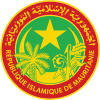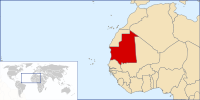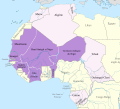Portal:Mauritania
The Mauritania Portal - بوابة موريتانيا
Mauritania, officially the Islamic Republic of Mauritania (Arabic: الجمهورية الإسلامية الموريتانية, al-Jumhūrīyah al-Islāmīyah al-Mūrītānīyah), is a sovereign country in Northwest Africa. It is bordered by the Atlantic Ocean to the west, Western Sahara to the north and northwest, Algeria to the northeast, Mali to the east and southeast, and Senegal to the southwest. By land area Mauritania is the 11th-largest country in Africa and 28th-largest in the world; 90% of its territory is in the Sahara. Most of its population of some 4.3 million lives in the temperate south of the country, with roughly a third concentrated in the capital and largest city, Nouakchott, on the Atlantic coast. The country's name derives from the ancient Berber kingdom of Mauretania in North Africa within the ancient Maghreb. Berbers occupied what is now Mauritania beginning in the third century AD. Arabs under the Umayyad Caliphate conquered the area in the late seventh century, bringing Islam, Arab culture, and the Arabic language. In the early 20th century, Mauritania was colonized by France as part of French West Africa. It achieved independence in 1960, but has since experienced recurrent coups and periods of military dictatorship. The most recent coup, in 2008, was led by General Mohamed Ould Abdel Aziz, who won subsequent presidential elections in 2009 and 2014. He was succeeded by Mohamed Ould Ghazouani following the 2019 elections, which were considered Mauritania's first peaceful transition of power since independence. Mauritania is culturally and politically part of the Arab world; it is a member of the Arab League and Arabic is the official language. The official religion is Islam, and almost all inhabitants are Sunni Muslims. Despite its prevailing Arab identity, Mauritanian society is multiethnic; the Bidhan, or so-called "white moors", make up 30% of the population, while the Haratin, or so-called "black moors", comprise 40%. Both groups reflect a fusion of Arab-Berber ethnicity, language, and culture. The remaining 30% of the population comprises various sub-Saharan ethnic groups. Despite an abundance of natural resources, including iron ore and petroleum, Mauritania remains poor; its economy is based primarily on agriculture, livestock, and fishing. Mauritania is generally seen as having a poor human rights record, and is particularly censured for the perpetuation of slavery as an institution within Mauritanian society, with an estimation by the 2018 Global Slavery Index of about 90,000 slaves in the country (or 2.1% of the population). (Full article...) Selected article -Mauritania's mineral sector was dominated by iron ore mining and beneficiation. Other mineral commodities produced in the country included cement, copper, gold, gypsum, petroleum, salt, and steel. The 'Ministère des Mines et de l’Industrie' was the Government agency responsible for enacting the Mining Code and for the coordination of all activities in the mining sector. The 'Direction des Mines et de la Géologie' was the entity responsible for promoting the mineral sector and for providing geologic and mining information to potential investors; the 'Direction des Hydrocarbures' was in charge of the development of the petroleum sector; and the 'Office Mauritanien des Recherches Géologiques' was the Government entity responsible for evaluating areas of mineral potential for exploration. The 'Société Nationale Industrielle et Minière (SNIM)' was responsible for iron ore production and benefciation. In 2007, the total value of exports from Mauritania was estimated to be about $1.5 billion. Excluding fish exports, which amounted to $254 million, all the main export categories were either mining or hydrocarbon products. Iron ore exports, which were valued at $575 million, represented about 38% of the country’s total exports; crude oil exports were valued at $339 million and accounted for 23%; copper exports were valued at $184 million and accounted for about 13%; and gold exports were valued at $59 million and accounted for 4% of total exports. All mineral commodity production increased during the year with the exception of crude petroleum, which decreased by about 51% to 5,487,000 barrels (872,400 m3) compared with 11,168,000 barrels (1,775,600 m3) in 2006. Cement production increased by 14.6% to 409,513 metric tons (t) compared with a revised 357,239 t in 2006. Gypsum production increased by 8.9%; iron ore production, by 6.8%; salt production, by about 35.5%; and crude steel production, by about 4.2%. The sharp increase in copper and gold production was owing to the opening of the Guelb Mohgrein Mine in late 2006. Mining, which was one of the country’s most important sectors to the national economy, contributed about 12% of the gross domestic product (GDP) and represented more than one-half of the country’s export earnings in 2005. according to the Ministère des Mines et de l’industrie (MMi), the development, diversification, and promotion of the mining sector have become the government’s priority in recent years. the number of foreign companies applying for prospecting licenses was increasing, and projects were at various stages ranging from grassroots exploration to mine development. (Full article...)This is a Good article, an article that meets a core set of high editorial standards.
Malouma Mint El Meidah (Arabic: المعلومة منت الميداح, romanized: al-Maʿlūma Mint al-Maydāḥ), also simply Maalouma or Malouma ( /mɑːloʊmɑː/; born October 1, 1960), is a Mauritanian singer, songwriter and politician. Raised in the south-west of the country by parents versed in traditional Mauritanian music, she first performed when she was twelve, soon featuring in solo concerts. Her first song "Habibi Habeytou" harshly criticized the way in which women were treated by their husbands. Though an immediate success, it caused an outcry from the traditional ruling classes. After being forced into marriage while still a teenager, Malouma had to give up singing until 1986. She developed her own style combining traditional music with blues, jazz, and electro. Appearing on television with songs addressing highly controversial topics such as conjugal life, poverty and inequality, she was censored in Mauritania in the early 1990s but began to perform abroad by the end of the decade. After the ban was finally lifted, she relaunched her singing and recording career, gaining popularity, particularly among the younger generation. Her fourth album, Knou (2014), includes lyrics expressing her views on human rights and women's place in society. Alongside her singing, Malouma has also fought to safeguard her country's music, urging the government to create a music school, forming her own foundation in support of musical heritage, and in 2014 creating her own music festival. She was elected a senator in 2007, the first politician in her caste, but was arrested the following year after a coup d'état. When elections were again held in 2009, she became a senator for the opposition Ech-Choura party where she was given special responsibilities for the environment. This led in 2011 to her appointment as the IUCN's Goodwill Ambassador for Central and West Africa. In December 2014, she announced she was moving from the opposition to join the ruling party, the Union for the Republic, where she felt she could be more effective in contributing to the country's progress. Her work has been recognized by the French, who decorated her as a Knight of the Legion of Honor, and the Americans, whose ambassador to Mauritania named her a Mauritanian Woman of Courage. (Full article...)CategoriesGeneral images -The following are images from various Mauritania-related articles on Wikipedia.
Related portalsWikiProjects
Topics in MauritaniaCities and towns
CommunesAssociated WikimediaThe following Wikimedia Foundation sister projects provide more on this subject:
Discover Wikipedia using portals | ||||||||||||||||||||||||||||||||||||||||||||||||||||||||||||||||













































